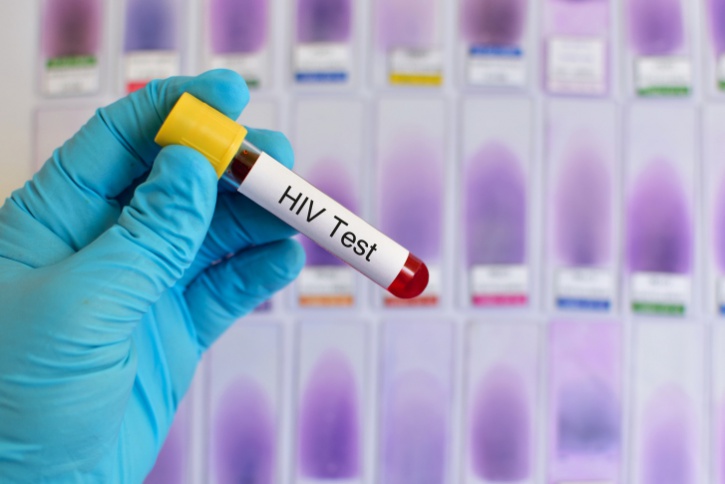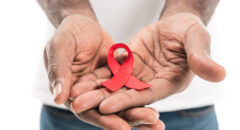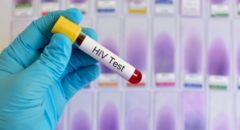
A human immunodeficiency virus (HIV) test detects antibodies to HIV or the genetic material (DNA or RNA) of HIV in the blood or another type of sample. This determines whether an HIV infection is present (HIV-positive).
But what don't you know about this test?
HIV infects white blood cells called CD4+ cells, which are part of the body's immune system that help fight infections. HIV can progress to acquired immunodeficiency syndrome (AIDS).
READ: It's HIV Testing Day! 8 Quick Facts You Should Know
How Long Does It Take?
After the original infection, it takes between 2 weeks and 6 months for antibodies to HIV to appear in the blood. The period between becoming infected with HIV and the point at which antibodies to HIV can be detected in the blood is called the seroconversion or "window" period. During this period, an HIV-infected person can still spread the disease, even though a test will not detect any antibodies in his or her blood.
Several tests can find antibodies or genetic material (RNA) to the HIV virus. These tests include:
Enzyme-linked immunosorbent assay (ELISA). This test is usually the first one used to detect infection with HIV. If antibodies to HIV are present (positive), the test is usually repeated to confirm the diagnosis. If ELISA is negative, other tests are not usually needed. This test has a low chance of having a false result after the first few weeks that a person is infected.
Western blot. This test is more difficult than the ELISA to perform, but it is done to confirm the results of two positive ELISA tests.
Polymerase chain reaction (PCR). This test finds either the RNA of the HIV virus or the HIV DNA in white blood cells infected with the virus. PCR testing is not done as frequently as antibody testing, because it requires technical skill and expensive equipment. This test may be done in the days or weeks after exposure to the virus. Genetic material may be found even if other tests are negative for the virus. The PCR test is very useful to find a very recent infection, determine if an HIV infection is present when antibody test results were uncertain, and screen blood or organs for HIV before donation.
Testing is often done at 6 weeks, 3 months, and 6 months after exposure to find out if a person is infected with HIV. The two types of HIV are: HIV-1, which causes almost all of the cases of AIDS worldwide; and HIV-2, which is found mostly in West Africa.
READ: Rae Lewis-Thornton: Ain't Nothing Pretty About AIDS
Why It Is Done
A test for the human immunodeficiency virus (HIV) is done to:
Detect an HIV infection. Testing is often done for people with risk factors for HIV infection and people who have symptoms of an HIV infection.
Screen blood, blood products, and organ donors to prevent the spread of HIV. Screen pregnant women for HIV infection. The United States Preventive Services Task Force recommends all pregnant women be screened. Pregnant women who are infected with HIV and receive treatment are less likely to pass the infection on to their babies than are women who do not receive treatment.
Find out if a baby born to an HIV-positive woman also is infected with HIV. PCR is often done in this case because the baby may get antibodies against HIV from the mother and yet not be infected.
The Centers for Disease Control and Prevention (CDC) recommend HIV screening as part of routine blood testing. You and your doctor can decide if testing is right for you.
This test is not done to determine if a person has AIDS. A diagnosis of AIDS means a person is...
... HIV-positive and other problems are present.
READ: Financially-Dependent Women Less Likely To Use Condoms
How To Prepare
You do not need to do anything before you have this test. Also, a test for HIV infection can't be done without your consent. Most doctors offer counseling before and after the test to discuss:
- How the test is done, what the results mean, and any other tests that may be done.
- How the diagnosis of an HIV infection may affect your social, emotional, professional, and financial outlooks.
- The benefits of early diagnosis and treatment.
- Before the test, it is important to tell your doctor how and where to contact you when your test results are ready. If your doctor has not contacted you within 1 to 2 weeks of your test, call and ask for your results.
How It Is Done
The health professional drawing blood will:
- Wrap an elastic band around your upper arm to stop the flow of blood. This makes the veins below the band larger so it is easier to put a needle into the vein.
- Clean the needle site with alcohol.
- Put the needle into the vein. More than one needle stick may be needed.
- Attach a tube to the needle to fill it with blood.
- Remove the band from your arm when enough blood is collected.
- Apply a gauze pad or cotton ball over the needle site as the needle is removed.
- Apply pressure to the site and then a bandage.
How It Feels
You may feel nothing at all from the needle puncture, or you may feel a brief sting or pinch as the needle goes through the skin. Some people feel a stinging pain while the needle is in the vein. But many people do not feel any pain (or have only minor discomfort) once the needle is positioned in the vein. The amount of pain you feel depends on the skill of the health professional drawing the blood, the condition of your veins, and your sensitivity to pain.
Risks
There is very little risk of complications from having blood drawn from a vein.
- You may develop a small bruise at the puncture site. You can reduce the risk of bruising by keeping pressure on the site for several minutes after the needle is withdrawn.
- In rare cases, the vein may become inflamed after the blood sample is taken. This condition is called phlebitis and is usually treated with a warm compress applied several times daily.
- Continued bleeding can be a problem for people with bleeding disorders. Aspirin, warfarin (Coumadin), and other blood-thinning medicines can also make bleeding more likely.
- If you have bleeding or clotting problems, or if you take blood-thinning medicine, tell your health professional before your blood is drawn.
Results
READ: HIV+? 10 Questions You Need To Ask Your Doctor
A human immunodeficiency virus (HIV) test detects antibodies to HIV or the genetic material (DNA or RNA) of HIV in blood or another type of sample. This determines whether an HIV infection is present (HIV-positive). ELISA results are usually available in 2 to 4 days. Results of the other tests, such as the Western blot or IFA, take 1 to 2 weeks.
Normal: No HIV antibodies are found. Normal results are called negative.
If an antibody test is done during the seroconversion period and is negative, repeat testing is needed. Most people have antibodies to HIV within 6 months after becoming infected. If a repeat test at 6 months is negative, there is no infection.
A PCR test to look for genetic material does not detect any RNA or DNA of HIV.
Uncertain: Test results do not clearly show whether a person has an HIV infection. This is usually called an indeterminate result. It may occur before HIV antibodies develop or when some other type of antibody is interfering with the results. If this occurs, a PCR test, which detects HIV RNA or DNA, may be done to see if the virus is present.
A person who still has indeterminate results for 6 months or longer is called "stable indeterminate" and is not considered to be infected with HIV.
Abnormal: HIV antibodies are found. These results are called positive.
A positive ELISA is repeated using the same blood sample. If two or more ELISA results are positive, they must be confirmed by a Western blot or IFA test.
A PCR test finds genetic material (RNA or DNA) of HIV.
Things That Affect HIV Tests
Reasons you may not be able to have the test or why the results may not be helpful include:
- Using corticosteroids.
- Antibody testing during the seroconversion period.
- Having an autoimmune disease, leukemia, or syphilis.
- Drinking too much alcohol.
What To Think About
READ: Sex & HIV: What To Say Before You Play
Follow Up. After initial testing, it is important for your doctor to contact you with the results of your test. Be sure to tell your doctor how and where to contact you. If your doctor has not contacted you within 1 to 2 weeks of your test, call and ask for your results.
False Positives. The ELISA is a good screening test, because it is usually positive when an HIV infection is present. But the ELISA test results can indicate HIV is present when it is not (false-positive). So the ELISA alone cannot be used to make a definite diagnosis of HIV infection. No one is considered HIV-positive until he or she has a positive Western blot, IFA, or PCR test.
Infants. Detecting HIV in a newborn infant is difficult. Until about 18 months of age, even a baby who is not infected may still have HIV antibodies received from his or her HIV-positive mother. A PCR test may be done to see if HIV genetic material (RNA or DNA) is present in the baby.
Time. To be certain that an HIV infection is not present, a person must test negative for the virus at least 6 months after the last possible exposure to HIV. Testing is often done at 6 weeks, 3 months, and 6 months to find out whether a person is infected.
Home Kits. Home blood test kits to detect an HIV infection are available without a prescription at pharmacies or through mail order. These kits provide instructions and materials for collecting a blood sample that is then sent to a lab for analysis. Results are available over the phone using an anonymous code number. Counseling is also available over the phone for people who use the test kit. Rapid test kits are also available and results are received within a half-hour, compared to 1 to 2 weeks with conventional testing. Positive rapid HIV test results need to be confirmed by a Western blot test.
Alternate Tests. A screening test for HIV infection may also be done on urine or saliva. An oral HIV test finds antibodies to HIV. Urine testing is rarely done. Oral test kits that find HIV-1 and HIV-2 in saliva have been approved by the United States Food and Drug Administration (FDA). The test results are provided the same day. Test results that show an HIV infection need to be confirmed by a Western blot test.
The Law. Most states require health professionals, clinics, and hospitals to report confirmed cases of HIV infection to the state health department. Some states allow anonymous reporting (the person's name or other identifying information is not provided). Other states require confidential reporting (identifying information is provided but only to authorized public health officials). All states must report the numbers of cases of AIDS, without names or other identifying information, to the Centers for Disease Control and Prevention (CDC).
Communicate. If you have a positive test result, contact your sex partners to inform them. They may want to be tested. You may be able to get help from your local health department to do this.
HIV+. After an HIV infection is present, other tests are done to determine when to treat the infection and how treatment is working. These tests include a CD4+ count and the viral load. For more information, see the topics CD4+ Count and Viral Load Measurement.
Two types of HIV have been identified.








